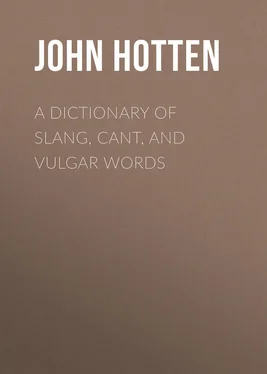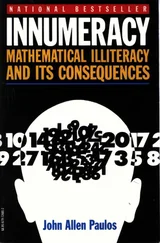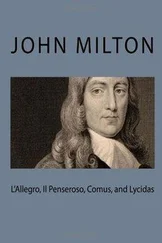John Hotten - A Dictionary of Slang, Cant, and Vulgar Words
Здесь есть возможность читать онлайн «John Hotten - A Dictionary of Slang, Cant, and Vulgar Words» — ознакомительный отрывок электронной книги совершенно бесплатно, а после прочтения отрывка купить полную версию. В некоторых случаях можно слушать аудио, скачать через торрент в формате fb2 и присутствует краткое содержание. ISBN: , Жанр: foreign_antique, foreign_prose, на английском языке. Описание произведения, (предисловие) а так же отзывы посетителей доступны на портале библиотеки ЛибКат.
- Название:A Dictionary of Slang, Cant, and Vulgar Words
- Автор:
- Жанр:
- Год:неизвестен
- ISBN:http://www.gutenberg.org/ebooks/47018
- Рейтинг книги:3 / 5. Голосов: 1
-
Избранное:Добавить в избранное
- Отзывы:
-
Ваша оценка:
- 60
- 1
- 2
- 3
- 4
- 5
A Dictionary of Slang, Cant, and Vulgar Words: краткое содержание, описание и аннотация
Предлагаем к чтению аннотацию, описание, краткое содержание или предисловие (зависит от того, что написал сам автор книги «A Dictionary of Slang, Cant, and Vulgar Words»). Если вы не нашли необходимую информацию о книге — напишите в комментариях, мы постараемся отыскать её.
A Dictionary of Slang, Cant, and Vulgar Words — читать онлайн ознакомительный отрывок
Ниже представлен текст книги, разбитый по страницам. Система сохранения места последней прочитанной страницы, позволяет с удобством читать онлайн бесплатно книгу «A Dictionary of Slang, Cant, and Vulgar Words», без необходимости каждый раз заново искать на чём Вы остановились. Поставьте закладку, и сможете в любой момент перейти на страницу, на которой закончили чтение.
Интервал:
Закладка:
Several words are entirely obsolete. “Alybbeg” no longer means a bed, nor “ASKEW” a cup. “Booget,” 17now-a-days, would not be understood for a basket; neither would “GAN” pass current for mouth. “Fullams” was the old cant term for false or loaded dice, and although used by Shakespere in this sense, is now unknown and obsolete. Indeed, as Tom Moore somewhere remarks, the present Greeks of St. Giles, themselves, would be thoroughly puzzled by many of the ancient canting songs, – taking for example, the first verse of an old favourite:
Bing out, bien Morts, and toure and toure,
Bing out, bien Morts, and toure;
For all your duds are bing’d awast;
The bien cove hath the loure. 18
But I think I cannot do better than present to the reader at once an entire copy of the first Canting Dictionary ever compiled. As before mentioned, it was the work of one Thos. Harman, a gentleman who lived in the days of Queen Elizabeth. Some writers have remarked that Decker 19was the first to compile a Dictionary of the vagabonds’ tongue; whilst Borrow, 20and Moore, the poet, stated that Richard Head performed that service in his Life of an English Rogue , published in the year 1680. All these statements are equally incorrect, for the first attempt was made more than a century before the latter work was issued. The quaint spelling and old-fashioned phraseology are preserved, and the reader will quickly detect many vulgar street words, old acquaintances, dressed in antique garb. 21
ABRAHAM-MEN , be those that fayn themselves to have beene mad, and have bene kept either in Bethelem, or in some other pryson a good time.
ALYBBEG , a bedde.
ASKEW , a cuppe.
AUTEM , a churche.
AUTEM MORTES , married wemen as chaste as a cowe.
BAUDYE BASKETS , bee women who goe with baskets and capcases on their armes, wherein they have laces, pinnes, nedles, whyte inkel, and round sylke gyrdels of all colours.
BECK [Beek], a constable.
BELLY-CHETE , apron.
BENE , good. Benar , better.
BENSHIP , very good.
BLETING CHETE , a calfe or sheepe.
BOOGET , a travelling tinker’s baskete.
BORDE , a shilling.
BOUNG , a purse [ Friesic , pong].
BOWSE , drink.
BOWSING-KEN , a alehouse.
BUFE [buffer, a man], a dogge.
BYNGE A WASTE , go you hence.
CACKLING-CHETE , a coke [cock], or capon.
CASSAN [cassam], cheese.
CASTERS , a cloake.
CATETH , “the vpright Cofe cateth to the Roge” [probably a shortening or misprint of Canteth ].
CHATTES , the gallowes.
CHETE [see what has been previously said about this word].
CLY [a pocket], to take, receive, or have.
COFE [cove], a person.
COMMISSION [mish], a shirt.
COUNTERFET CRANKE , these that do counterfet the Cranke be yong knaves and yonge harlots, that deeply dissemble the falling sicknes.
CRANKE [cranky, foolish], falling evil [or wasting sickness].
CRASHING-CHETES , teeth.
CUFFEN , a manne [a cuif in Northumberland and Scotland signifies a lout or awkward fellow].
DARKEMANS , the night.
DELL , a yonge wench.
DEWSE-A-VYLE , the countrey.
DOCK , to deflower.
DOXES , harlots.
DRAWERS , hosen.
DUDES [or dudds], clothes.
FAMBLES , handes.
FAMBLING-CHETE , a ring on one’s hand.
FLAGG , a groat.
FRATER , a beggar wyth a false paper.
FRESHE-WATER-MARINERS , these kind of caterpillers counterfet great losses on the sea: – their shippes were drowned in the playne of Salisbury.
FYLCHE , to robbe: Fylch-man [a robber].
GAGE , a quart pot.
GAN , a mouth.
GENTRY COFE , a noble or gentle man.
GENTRY-COFES-KEN , a noble or gentle man’s house.
GENTRY MORT , a noble or gentle woman.
GERRY , excrement.
GLASYERS , eyes.
GLYMMAR , fyer.
GRANNAM , corne.
GRUNTING-CHETE , a pygge.
GYB , a writing.
GYGER [jigger], a dore.
HEARING-CHETES , eares.
JARKE , a seale.
JARKEMAN , one who make writings and set seales for [counterfeit] licences and pasports.
KEN , a house.
KYNCHEN CO [or cove ], a young boye trained up like a “ Kynching Morte .” [From the German diminutive Kindschen .]
KYNCHING MORTE , is a little gyrle, carried at their mothers’ backe in a slate, or sheete, who brings them up sauagely.
LAG , water.
LAG OF DUDES , a bucke [or basket] of clothes.
LAGE , to washe.
LAP , butter, mylke, or whey.
LIGHTMANS , the day.
LOWING-CHETE , a cowe.
LOWRE , money.
LUBBARES , – “sturdy Lubbares ,” country bumpkins, or men of a low degree.
LYB-BEG , a bed.
LYCKE [lick], to beate.
LYP , to lie down.
LYPKEN , a house to lye in.
MAKE [mag], a halfpenny.
MARGERI PRATER , a hen.
MILLING , to steale [by sending a child in at the window].
MOFLING-CHETE , a napkin.
MORTES [motts], harlots.
MYLL , to robbe.
MYNT , gold.
NAB [nob], a heade.
NABCHET , a hat or cap.
NASE , dronken.
NOSEGENT , a nunne.
PALLYARD , a borne beggar [who counterfeits sickness, or incurable sores. They are mostly Welshmen, Harman says].
PARAM , mylke.
PATRICO , a priest.
PATRICOS KINCHEN , a pygge [a satirical hit at the church, Patrico meaning a parson or priest, and Kinchen his little boy or girl].
PEK [peckish], meat.
POPPELARS , porrage.
PRAT , a buttocke.
PRATLING-CHETE , a toung.
PRAUNCER , a horse.
PRIGGER OF PRAUNCERS , be horse stealers, for to prigge signifieth in their language to steale, and a Prauncer is a horse, so being put together, the matter was playn. [Thus writes old Thomas Harman, who concludes his description of this order of “pryggers,” by very quietly saying, “I had the best gelding stolen out of my pasture, that I had amongst others, whyle this book was first a printing.”]
PRYGGES , dronken Tinkers, or beastly people.
QUACKING-CHETE , a drake or duck.
QUAROMES , a body.
QUIER [queer], badde [see what has been previously said about this word].
QUYER CRAMP-RINGES , boltes or fetters.
QUIER CUFFIN , the iustice of peace.
QUYER-KYN , a pryson house.
RED SHANKE , a drake or ducke.
ROGER , a goose.
ROME , goode [now curious, noted, or remarkable in any way. Rum is the modern orthography].
ROME BOUSE [rum booze], wyne.
ROME MORT , the Queene [Elizabeth].
ROME VYLE [or Rum-ville], London.
RUFF PECK , baken [short bread, common in old times at farm houses].
RUFFMANS , the woods or bushes.
SALOMON , a alter or masse.
SKYPPER , a barne.
SLATE , a sheete or shetes.
Читать дальшеИнтервал:
Закладка:
Похожие книги на «A Dictionary of Slang, Cant, and Vulgar Words»
Представляем Вашему вниманию похожие книги на «A Dictionary of Slang, Cant, and Vulgar Words» списком для выбора. Мы отобрали схожую по названию и смыслу литературу в надежде предоставить читателям больше вариантов отыскать новые, интересные, ещё непрочитанные произведения.
Обсуждение, отзывы о книге «A Dictionary of Slang, Cant, and Vulgar Words» и просто собственные мнения читателей. Оставьте ваши комментарии, напишите, что Вы думаете о произведении, его смысле или главных героях. Укажите что конкретно понравилось, а что нет, и почему Вы так считаете.












